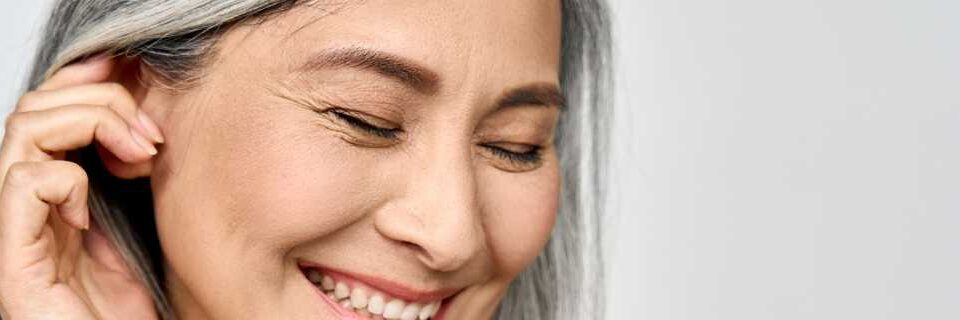
Demystifying Self-Hypnosis for Anxiety: How an Anxiety App Can Help
Table of Contents
Menopause is a natural biological process that signifies the end of a woman’s menstrual cycles. It is a milestone that marks the conclusion of the reproductive years, much like the onset of menstruation during adolescence indicates its beginnings. However, the transition to menopause, also known as perimenopause, can be challenging with significant physical, emotional, and psychological impacts.
During this transition, women often experience symptoms such as hot flashes, night sweats, mood changes and sleep problems. Other menopause symptoms include vaginal dryness and weak bones. Diminishing levels of estrogen and progesterone in the body cause these changes. In addition, the severity and duration of the menopause symptoms vary widely among individuals, making it a unique experience for every woman.
Dealing with these transformations can be challenging, but tools like self-hypnosis have shown promise in helping manage some of the symptoms arriving with menopause. Self-hypnosis is a self-induced state of focused attention that can be used to improve behavior, emotions, and physical well-being. This introduction to “menopause how to help “will delve into the intricacies of menopause and explore how self-hypnosis can be used as a coping tool.
Understanding Menopause
When going through menopause, women remember the various changes in the body happening when ovaries produce fewer hormones. The most noticeable sign of the decrease in estrogen levels is the cessation of menstrual periods, but several other symptoms often accompany this transition.
Hot Flashes and Night Sweats
Hot flashes (also spelled hot flushes) are one of the most common symptoms of menopause, characterized by a sudden surge of warmth in the upper body, often beginning in the face, neck, or chest, and then spreading upwards or downwards. Night sweats are hot flashes happening at night and can disrupt sleep.
Sleep Problems
Many women experience insomnia or disrupted sleep during menopause. Poor sleep can be due to night sweats, anxiety, or hormonal changes.
Mood Changes
Mood swings are common during menopause, with women experiencing various emotions from irritability to sadness. Some women may also feel fatigued or suffer from a lack of motivation.
Vaginal Dryness and Urinary Incontinence
During menopause, diminished estrogen levels can result in the vaginal walls becoming dry, thin, and inflamed a condition referred to as vaginal atrophy. This change can cause discomfort during sexual intercourse and increase the risk of urinary problems.
Another common urinary symptom is nocturia, which is the need to urinate frequently during the night.
Painful urination, also known as dysuria, can occur due to the thinning and drying of the urethra and vaginal tissues.
Stress incontinence is another symptom of involuntary urine leakage when pressure is put on the bladder, for example, when coughing, sneezing, laughing, or lifting objects.
Urge incontinence, characterized by a sudden and strong urge to urinate followed by an unintended leakage of urine, is also common among menopausal women.
In addition, menopausal women may experience frequent urination and urinary tract infections.
These symptoms can be distressing but are not inevitable parts of aging or menopause. Various treatment options are available, including lifestyle modifications, pelvic floor exercises, medications, and alternative therapies.
Depression and Anxiety
Menopause can increase the risk of developing depression and anxiety. Hormonal changes, coupled with the physical changes happening in the body and disrupted sleep, can contribute to feelings of sadness, fear, and unease.
Other Menopausal Symptoms
Other symptoms may include weight gain, changes in hair and skin, memory problems, and decreased libido. With such a wide array of symptoms, effective coping strategies become crucial to navigate this life transition.
What is Self-Hypnosis?
Self-hypnosis, as the term suggests, involves inducing a state of hypnosis on one’s own. It’s a powerful self-help tool that utilizes your brain and the power of the subconscious mind to create positive changes in one’s life. Used correctly, it can effectively manage stress, overcome fears, improve sleep, and boost overall well-being.
Enjoying the Benefits of Hypnotherapy at Home
One of the significant advantages of self-hypnosis is the convenience it offers. You can practice it in the comfort of your own home at a time that suits you best. All you need is a quiet space where you won’t be disturbed and a good understanding of the techniques involved. This accessibility makes it an appealing option for those who may not have the time or resources to visit a professional hypnotherapist.
How Does Self-Hypnosis Work?
Self-hypnosis works by guiding the individual into a deeply relaxed state, often called a trance. In this state, the mind becomes more open and receptive to suggestions. The individual then introduces positive affirmations or visualizations to help influence their behavior, thoughts, or feelings. It is important to note that even in a hypnotic state, the person maintains control and can easily return to full consciousness at any time.
Benefits of Self-Hypnosis and Its Potential Uses
Self-hypnosis can be used to address a wide range of issues. For instance, it can improve sleep quality by calming the mind and relaxing the body, making it easier to drift off to sleep.
For stress relief, self-hypnosis can help individuals to release tension, promote relaxation, and foster a sense of peace and calm. Focusing on positive imagery and calming thoughts provides a much-needed safe place from the stresses of daily life.
Self-hypnosis can be a powerful tool to provide relief from anxiety and depression. Individuals can learn to challenge negative thought patterns, promote positive thinking, and cultivate a more optimistic outlook on life. While self-hypnosis can be a useful adjunctive tool, it should not replace professional mental health support for these conditions.
In conclusion, self-hypnosis is a versatile and accessible tool supporting well-being and personal growth. It allows individuals to tap into their subconscious mind’s power, promoting change from within.

How can Self-Hypnosis Help with Menopause Symptoms?
Menopause is a natural transition in a woman’s life that often comes with a host of physical and emotional symptoms, including mood swings, hot flashes, sleep disturbances, and cognitive changes. While hormone replacement therapy (HRT) has been the traditional go-to approach to treat menopause symptoms, it’s not suitable for everyone and can come with its own side effects. A growing body of research suggests self-hypnosis could be a safe and non-invasive alternative to menopausal hormone therapy and help manage menopause symptoms.
The Science of Self-Hypnosis and Hypnotherapy
Self-hypnosis is a form of hypnotherapy where an individual learns to induce a state of focused attention and heightened suggestibility on their own. A self-hypnosis treatment is based on the premise that the mind can influence the body’s physiology. By tapping into the power of the subconscious mind, self-hypnosis can help individuals manage and reduce the intensity of menopausal symptoms.
Self-hypnosis is not an “alternative medicine” but a recognized therapeutic approach backed by scientific research. A 2013 study published in the journal Menopause found that women who used hypnosis had 74% fewer hot flashes at the end of a 12-week program than the control group. Moreover, the benefits were sustained at a 6-month follow-up, indicating the long-term efficacy of this approach. This study shows self-hypnosis potential to reduce hot flashes and night sweats.
Benefits of Self-Hypnosis for Menopausal Women
Self-hypnosis offers several key benefits for women going through menopause.
Reduced Hot Flashes: As noted above, self-hypnosis can reduce the frequency and intensity of hot flashes significantly, one of the most common and disruptive symptoms of menopause.
Improved Sleep: Hypnosis can also help address insomnia and sleep disturbances, which are common during menopause. A study published in the journal Sleep in 2014 concluded that women who used hypnosis experienced improved sleep quality.
Improved relaxation: When you practice relaxation techniques based on self-hypnosis, your stress levels go down, which facilitates in healing and better decision-making.
Emotional Well-being: By promoting relaxation and stress reduction, self-hypnosis can help manage mood swings and anxiety associated with menopause.
Non-Invasive and Safe: Unlike some types of menopausal hormone therapy, which carries risks such as blood clots and certain types of cancer, self-hypnosis is a non-invasive, drug-free method with long-lasting positive effects.
Self-hypnosis can offer a safe and effective way to manage menopause symptoms. The North American Menopause Society lists it as one menopause management option. As always, learning self-hypnosis techniques from a trained professional is recommended to ensure proper application and maximum benefits. A hypnosis app voiced by a professional hypnotherapist can make a large difference.
How to Practice Self-Hypnosis
Learning how to practice self-hypnosis can be a game-changer in navigating the menopause journey. Here’s a simple, step-by-step guide on how to start:
- Find a calm place: This is the first step towards a successful self-hypnosis session. Choose a quiet and comfortable space where you are less likely to be interrupted. It could be a cozy corner of your home or even a peaceful outdoor spot.
- Place headphones: For a more immersive experience, use headphones. They help you focus better by blocking out external noise, while you concentrate on the self-hypnosis audio.
- Start your self-hypnosis audio: Choose your UpNow self-hypnosis audio, designed explicitly for menopause symptoms. Start the audio and allow your hypnotherapist voice to guide you into a state of deep relaxation and focus.
If you are a beginner, remember that practice makes perfect. Stay energized if you find it challenging initially. Like any new skill, it takes time and patience. To make self-hypnosis more effective, incorporate it into your daily routine. Consistency is key here. The more regularly you practice, the better you will get at entering a hypnotic state and leveraging its benefits.
While self-hypnosis is generally safe, there are a few important reminders and precautions. Never practice self-hypnosis while driving or operating machinery, as self-hypnosis requires full attention and induces deep relaxation. Always ensure you’re in a safe, secure environment when practicing.
Remember, self-hypnosis is not about losing control but rather about empowering yourself to manage the physical and emotional challenges of menopause more effectively. So, take a deep breath, press play, and let your mind guide you to a more comfortable transition through menopause.
Other Helpful Strategies for Managing Menopause
While self-hypnosis can be a powerful tool, it is just one part of a holistic approach to managing menopause. This approach also includes strategies such as diet, exercise, and mindfulness practices.
Exercise Benefits
Regular physical activity is essential during menopause. It helps maintain a healthy weight, boosts mood, improves sleep, and can alleviate symptoms such as hot flashes and night sweats. Starting an exercise routine, you enjoy and can maintain consistently is beneficial.
Lifestyle Changes to Improve Hot Flashes
Specific triggers like spicy or processed foods, alcohol, and stress can exacerbate hot flashes. Identifying and avoiding these triggers, dressing in light layers, and using a fan or air conditioner can help manage this symptom.
Relaxation to Lessen Anxiety and Other Menopausal Symptoms
Relaxation techniques such as yoga, mindfulness, and deep-breathing exercises can significantly reduce menopausal symptoms such as hot flashes, night sweats, anxiety, and depression. These practices promote mental clarity, reduce stress, and improve overall well-being.
In addition, one of the other vital aspects of this guide “menopause how to help” is ensuring emotional support and understanding from close friends and family.
Preferred Diet to Support Women During and After Menopause
A balanced diet of vegetables, fruits, whole grains, and proteins can relieve menopause symptoms. Certain supplements, like vitamin D and calcium, are crucial for bone health during menopause. Avoiding processed foods and reducing caffeine and alcohol intake can also help manage symptoms.
Food to Avoid
Certain foods can exacerbate hot flashes and night sweats; hence, it’s beneficial to be mindful of the type of food to avoid during the menopausal transition:
1. Caffeine: Caffeine can trigger hot flashes and night sweats. It can also disrupt sleep patterns, which are often already disturbed due to hormonal changes during menopause.
2. Alcohol: Like caffeine, alcohol can exacerbate hot flashes and interfere with sleep. It can also affect mood and contribute to weight gain.
3. Processed Foods: These often contain high levels of salt and sugar, leading to weight gain and increasing the risk of heart disease. They can also cause bloating and exacerbate menopausal symptoms.
4. Sugary Foods: High-sugar foods can spike blood sugar levels, leading to energy crashes and weight gain. They can also worsen mood swings.
5. Spicy Foods: These might trigger hot flashes in some women.
6. Fatty Meats: Foods high in saturated fats like bacon and brisket can lower the body’s serotonin levels, affecting mood and sleep.
Everyone is different, and what might negatively impact one person might not have the same effect on another. As a result, it is always a good idea to consult with a healthcare provider or a dietitian who can create a personalized dietary plan for your specific needs and symptoms.

Your Self-Hypnosis App for Menopause Relief is UpNow
In conclusion, combined with other holistic strategies, self-hypnosis can help manage menopause symptoms effectively. The power of the mind is immense, and by harnessing this power through self-hypnosis, you can navigate this transitional phase with greater ease and confidence.
Finally, “menopause how to help” is about managing physical symptoms and addressing this significant life transition’s emotional and mental health aspects. An increasing number of menopausal women are turning to self-hypnosis as part of their menopause symptom management strategy to reduce hot flashes and lead a happier life. It is a testament to the growing recognition of the mind-body connection and the potential of self-hypnosis to foster positive change.
Why not take the reins of your menopause journey today? Consider exploring self-hypnosis as part of your holistic approach to managing menopause, particularly hot flashes. The transition to menopause is a significant life stage, and with the right tools, you can navigate it with confidence and grace. Embrace the change and empower yourself through the transformative power of self-hypnosis.
Sign up and join the waitlist for the UpNow self-hypnosis app. It’s time to embrace the change and empower yourself!
UpNow Health only uses high-quality sources, including peer-reviewed articles, to support the facts within our articles. Experts review all our articles to ensure our content is accurate, helpful, and trustworthy.
1. National Health Service (NHS), Benefits and risks of hormone replacement therapy (HRT), Link
2. Otte JL, Carpenter JS, Roberts L, Elkins GR. Self-Hypnosis for Sleep Disturbances in Menopausal Women. J Womens Health (Larchmt). 2020 Mar;29(3):461-463. doi: 10.1089/jwh.2020.8327. PMID: 32186967; PMCID: PMC7097677.
3. North American Menopause Society, Glossary, Link
4. Elkins, G, Johnson, A., Fisher, W., Sliwinski, J., & Keith, T. (2013) A Pilot Investigation of Guided Self-Hypnosis in Treatment of Hot Flashes Among Postmenopausal Women, International Journal of Clinical & Experimental Hypnosis, 61:3, 342-350, DOI: 10.1080/00207144.2013.784112
5. Elkins, G. R., Fisher, W. I., Johnson, A. K., Carpenter, J. S., & Keith, T. Z. (2013). Clinical hypnosis in the treatment of postmenopausal hot flashes: a randomized controlled trial. Menopause (New York, N.Y.), 20(3), 291–298. https://doi.org/10.1097/gme.0b013e31826ce3ed
6. Otte JL, Carpenter JS, Roberts L, Elkins GR. Self-Hypnosis for Sleep Disturbances in Menopausal Women. J Womens Health (Larchmt). 2020 Mar;29(3):461-463. doi: 10.1089/jwh.2020.8327. PMID: 32186967; PMCID: PMC7097677.
7. Cordi MJ, Schlarb AA, Rasch B. Deepening sleep by hypnotic suggestion. Sleep. 2014 Jun 1;37(6):1143-52, 1152A-1152F. doi: 10.5665/sleep.3778. PMID: 24882909; PMCID: PMC4015388.














